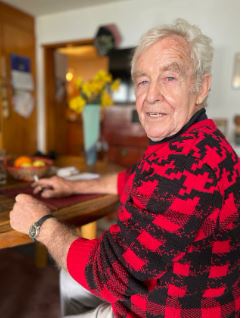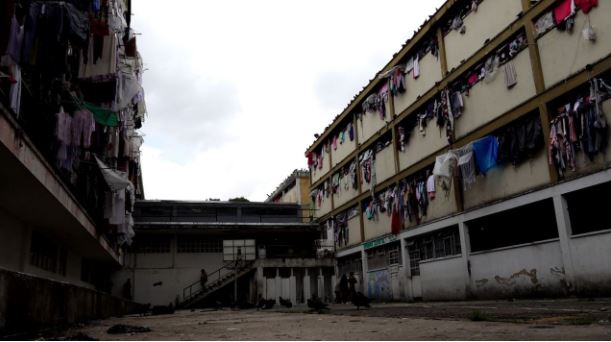
An internet scam and cocaine: a Swiss imprisoned abroad

It’s a story that could be taken from a film: a 60-year-old Swiss woman was arrested in 2021 at Bogotá airport with more than three kilogrammes of cocaine in her luggage. She claims to be a victim of fraud. Colombian judges ruled against her, convicting her on drug charges. Swiss public television, RTS, met the woman in Colombia.
Elisabeth and Peter Baumgartner are a retired couple much like any other. They do not live opulently, but they enjoy a decent retirement. They live in Gams, a small village surrounded by mountains in canton St Gallen.
Peter, a former chimney sweep, has a weakness for bargains on the internet, as he previously told the Neue Zürcher Zeitung (NZZ) newspaper.
When he receives an email in September 2021, promising a mysterious inheritance of several million francs and a trip to Colombia, he falls straight into the trap.
“You have won a free trip to Bogotá, the email promised. All expenses paid. At the time it was our 30th wedding anniversary. It was great timing. We could go to Bogotá,” Peter tells RTS.

At first, his wife Elisabeth is not convinced. Her husband however insists, until she finally gives in. “He insisted so much that in the end I answered: ‘Okay, I’m coming with you’. When you’ve been married for 30 years, you don’t give up easily,” she says in an interview with RTS in Bogotá in mid-March.
Traveling to Bogotá
Any reservations they harboured fade as the flight tickets arrive. On September 17, 2021, the couple flies to Bogotá. They also receive pocket money of $1,000 (CHF900) from their contact person. “The week there was great,” Peter tells RTS. “Everything was wonderful. Until the agent came.”
The agent invites the couple to dinner at a restaurant. He explains that there is a small problem with the inheritance. The money is still there, but they would have to return to Europe to collect it. The return ticket is paid for as a gift.
The agent only has one condition: the couple should take a gift for a friend with them in their luggage. Elisabeth asks him if it was legal. “The man said it was 100% legal,” Peter Baumgartner told RTS. “I looked at the gift. It was a kind of plastic tube, 30 cm high, with six small rolls in it, along with two little picture books.”
Despite Elisabeth’s renewed doubts, the couple put the package in their suitcase and leave for the airport.
The arrest
The check-in process is uneventful, and the couple take their seats on the plane. The engines start up and the crew prepares for take-off.
Elisabeth remembers the moment when everything changed. “I was sitting comfortably, had taken off my shoes, the headphones were already on, the TV was already set. Then the stewardess came up to me, said my name and asked if it was really me? And when I confirmed that it was, she said told me to come with her.”
Outside the plane, two officers handcuff her and lead her to the airport police station.
“They opened my suitcase and took out the rolls of paper and the two books. They opened the rolls a bit and I see white powder coming out. And I think, ‘my God, this is heroin!”
The police discover more than three kilograms of pure cocaine. “It all seemed so strange to me. I had never thought that there could be cocaine in there. I didn’t even know what it looked like,” Elisabeth recalls. She is immediately arrested.
Imprisoned in Colombia
Elisabeth is imprisoned in Bogotá’s women’s prison, “El Buen Pastor”. Around 1800 inmates, most of them Colombian, live together in very close quarters.
“It’s so big… There was so much pressure, it was indescribable. They just locked me in there. There is no hot water, only cold water. There is no fixed shower, just a hose coming out of the wall. There are no electrical sockets, they are all ripped out”.

An experience all the more traumatic as she doesn’t speak a word of Spanish: “I was there for three weeks. I lost seven kilos. The isolation was total.”
With the help of the Swiss embassy, she is released under the condition of staying in house arrest in the Colombian capital. Today she lives in a one-room flat, which she pays for with her Swiss pension. Her neighbours give her money to live on.
Elisabeth Baumgartner doesn’t want to know anything more about her husband: “He is dead to me. He is the reason why my life was stolen from me. I have no more anger. Everything is just dead. He is the one who put me in this situation. He also says it is his fault. But he’s not in Colombia. He is a free man!”
The trial
On March 16, at 8 am, Elisabeth’s trial begins. She is summoned to the court in Bogotá. She comes accompanied by the Swiss vice-consul in Colombia and her lawyer.
Everything is at stake for Elisabeth. But she has no choice. Her lawyer has warned her: if she does not plead guilty, she will have to spend at least 12 years in prison. He advises her to make a deal with the Colombian justice system and receive a lighter sentence in return. Reluctantly, she agrees. She pleads guilty and eventually receives a prison sentence of five years and four months as well as a fine of fine of $140,000.
The next question is whether she will be able to continue serving her sentence under house arrest or whether she will have to return to prison.
Peter returns home
Peter now lives without Elisabeth, but he is free. When he returned to Switzerland, he faced criticism: “At first, people said to me, ‘You’re a weirdo’,” he says with a laugh. “I replied that I already knew that.”
When asked if he felt guilty, he replies, “Yes. I can’t say no. I’m the one who got us into this mess, I organised everything.”
Elisabeth has to practice patience. She is alone in a huge city over 9,000 kilometres away from Switzerland. If she has to serve out her sentence, she will have to wait another four years before she can leave Colombia.
This text was first published by RTS and is reproduced here with permission.

In compliance with the JTI standards
More: SWI swissinfo.ch certified by the Journalism Trust Initiative




























You can find an overview of ongoing debates with our journalists here . Please join us!
If you want to start a conversation about a topic raised in this article or want to report factual errors, email us at english@swissinfo.ch.